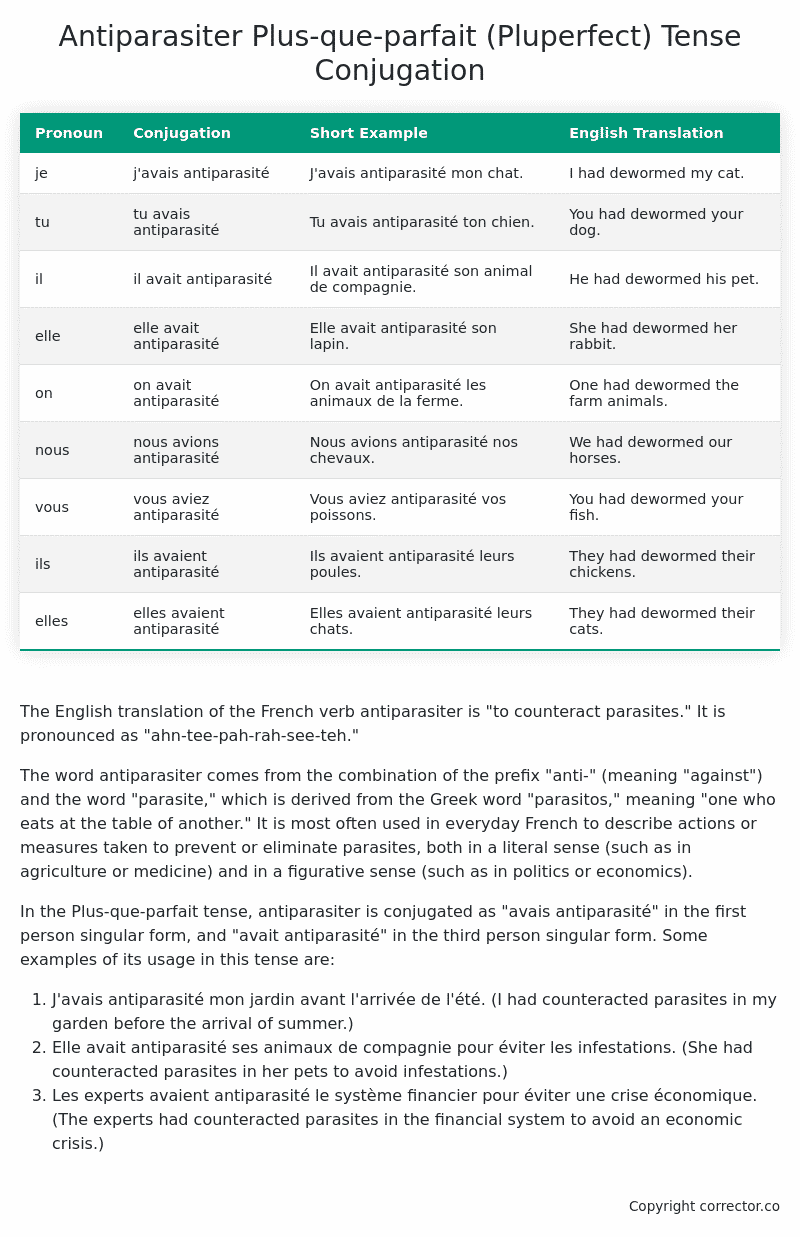Plus-que-parfait (Pluperfect) Tense Conjugation of the French Verb antiparasiter
Introduction to the verb antiparasiter
The English translation of the French verb antiparasiter is “to counteract parasites.” It is pronounced as “ahn-tee-pah-rah-see-teh.”
The word antiparasiter comes from the combination of the prefix “anti-” (meaning “against”) and the word “parasite,” which is derived from the Greek word “parasitos,” meaning “one who eats at the table of another.” It is most often used in everyday French to describe actions or measures taken to prevent or eliminate parasites, both in a literal sense (such as in agriculture or medicine) and in a figurative sense (such as in politics or economics).
In the Plus-que-parfait tense, antiparasiter is conjugated as “avais antiparasité” in the first person singular form, and “avait antiparasité” in the third person singular form. Some examples of its usage in this tense are:
- J’avais antiparasité mon jardin avant l’arrivée de l’été. (I had counteracted parasites in my garden before the arrival of summer.)
- Elle avait antiparasité ses animaux de compagnie pour éviter les infestations. (She had counteracted parasites in her pets to avoid infestations.)
- Les experts avaient antiparasité le système financier pour éviter une crise économique. (The experts had counteracted parasites in the financial system to avoid an economic crisis.)
Table of the Plus-que-parfait (Pluperfect) Tense Conjugation of antiparasiter
| Pronoun | Conjugation | Short Example | English Translation |
|---|---|---|---|
| je | j’avais antiparasité | J’avais antiparasité mon chat. | I had dewormed my cat. |
| tu | tu avais antiparasité | Tu avais antiparasité ton chien. | You had dewormed your dog. |
| il | il avait antiparasité | Il avait antiparasité son animal de compagnie. | He had dewormed his pet. |
| elle | elle avait antiparasité | Elle avait antiparasité son lapin. | She had dewormed her rabbit. |
| on | on avait antiparasité | On avait antiparasité les animaux de la ferme. | One had dewormed the farm animals. |
| nous | nous avions antiparasité | Nous avions antiparasité nos chevaux. | We had dewormed our horses. |
| vous | vous aviez antiparasité | Vous aviez antiparasité vos poissons. | You had dewormed your fish. |
| ils | ils avaient antiparasité | Ils avaient antiparasité leurs poules. | They had dewormed their chickens. |
| elles | elles avaient antiparasité | Elles avaient antiparasité leurs chats. | They had dewormed their cats. |
Other Conjugations for Antiparasiter.
Le Present (Present Tense) Conjugation of the French Verb antiparasiter
Imparfait (Imperfect) Tense Conjugation of the French Verb antiparasiter
Passé Simple (Simple Past) Tense Conjugation of the French Verb antiparasiter
Passé Composé (Present Perfect) Tense Conjugation of the French Verb antiparasiter
Futur Simple (Simple Future) Tense Conjugation of the French Verb antiparasiter
Futur Proche (Near Future) Tense Conjugation of the French Verb antiparasiter
Plus-que-parfait (Pluperfect) Tense Conjugation of the French Verb antiparasiter (this article)
Passé Antérieur (Past Anterior) Tense Conjugation of the French Verb antiparasiter
Futur Antérieur (Future Anterior) Tense Conjugation of the French Verb antiparasiter
Subjonctif Présent (Subjunctive Present) Tense Conjugation of the French Verb antiparasiter
Subjonctif Passé (Subjunctive Past) Tense Conjugation of the French Verb antiparasiter
Subjonctif Imparfait (Subjunctive Imperfect) Tense Conjugation of the French Verb antiparasiter
Conditionnel Présent (Conditional Present) Tense Conjugation of the French Verb antiparasiter
Conditionnel Passé (Conditional Past) Tense Conjugation of the French Verb antiparasiter
L’impératif Présent (Imperative Present) Tense Conjugation of the French Verb antiparasiter
L’infinitif Présent (Infinitive Present) Tense Conjugation of the French Verb antiparasiter
Struggling with French verbs or the language in general? Why not use our free French Grammar Checker – no registration required!
Get a FREE Download Study Sheet of this Conjugation 🔥
Simply right click the image below, click “save image” and get your free reference for the antiparasiter Plus-que-parfait tense conjugation!

Antiparasiter – About the French Plus-que-parfait (Pluperfect) Tense
Tense Formation
Common everyday usage patterns
Sequencing of past events
Background information
Hypothetical or reported speech
Interactions with other tenses
Summary
I hope you enjoyed this article on the verb antiparasiter. Still in a learning mood? Check out another TOTALLY random French verb conjugation!


